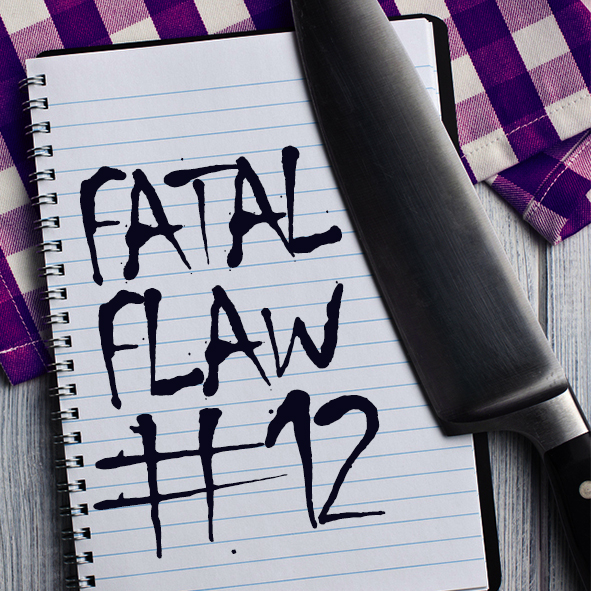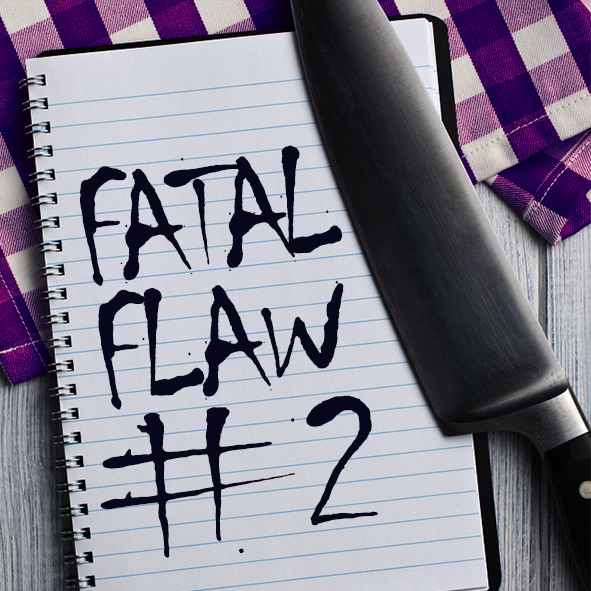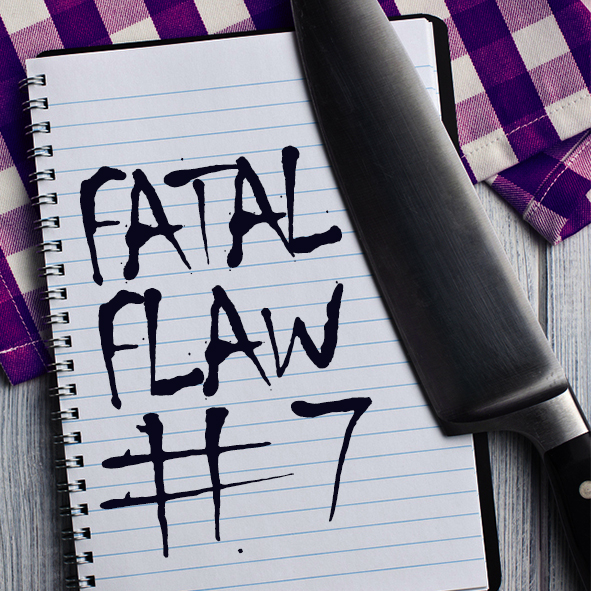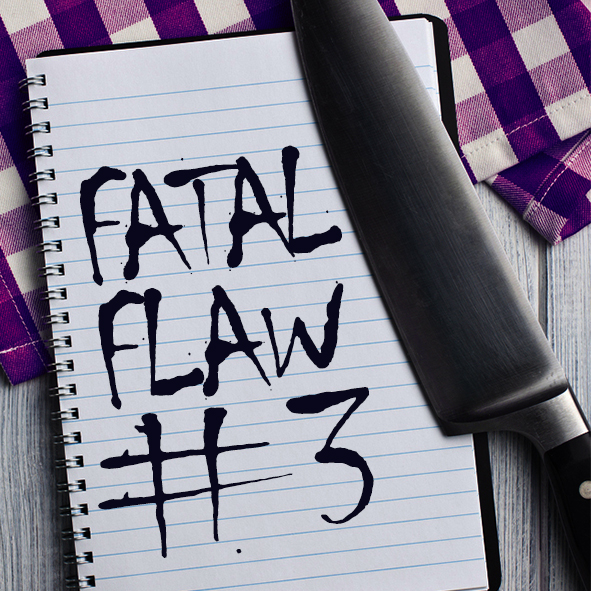Writing Mechanics: Scene Structure as a Mini Novel
This month we wrap up our yearlong look at the 12 Fatal Flaws of Fiction Writing. Editor Rachel Starr Thomson opens up our look at Fatal Flaw #12: Flawed Writing Mechanics. We’ll be looking at the bigger picture regarding our fiction, and Rachel begins with a look at scene structure.
Way back in month 2 of this series, we talked about the need to open scenes in the right place. The general rule is to open in media res—that is, while something is happening. On the other hand, it’s generally best to bow out while things are still happening: close the dinner conversation with the last line of dialog, not after everyone has fallen silent, gotten up from the table, washed the dishes, and gone to bed.
To put that succinctly: “Come late; leave early.”
We’ve also looked at various elements of a great scene: action, pacing, description, dialog, POV, the many ways to show and not just tell your story.
But as our yearlong series wraps up this month, we’re going to take a step back and look at scenes as a whole. We’ll be paying some attention to genre and how certain genres call for certain writing styles.
This week, I want to kick things off by discussing the all-important structure of a scene.
The Miniature Novel
We’ve already established that it’s best to come late. But once we’ve arrived in a scene, what do we do there? Let’s look at a couple of different passages.
EXAMPLE 1:
Honey felt a tug on the line.
“Reel ’er in slow,” Grandpa said.
It was a slow, lazy afternoon on the river, the kind Honey loved. Grandpa was in a chatty mood, and they whiled away the hours fishing—sort of—while he shared memories from the past.
“Grandma and me used to come do this,” he said. “The other girls thought it was strange that she liked to fish, but I guess she did. Or else she just liked to spend the time with me.”
Honey smiled. She understood her grandmother. There was nothing nicer than spending time with someone you loved on a sunny day on the river, feeling the cool breeze and the splash of the water when you tried to bring a fish in. Not that it ever seemed important to really catch one.
“Well, I guess it’s time we go home and get dinner,” Grandpa finally said.
This example is not even a scene. It’s a snapshot, a vignette (and even then, it’s an incomplete one). Although it opens well enough—in media res—and ends with a sense of closure, it goes nowhere in between.
Scenes are the building blocks of a story. If you were to cobble together a hundred snapshots like the one above, you would not have a story at the end of it.
In fact, a scene is not just a building block for a novel; it’s something of a novel in miniature. Scenes follow the same general path a novel does: they begin with a status quo, move through an incident that changes that status, and then build to something—a reveal, a confrontation, a climax of some kind. Often they will dip down into a resolution as well, though not always.
Scene structure mirrors that of any drama:
- Status quo
- Inciting incident
- Challenge(s)
- Climax
- Resolution (Optional—since scenes are only smaller parts of a bigger story, they can end in cliffhangers, whereas a novel cannot.)
If Honey had caught a fish (inciting incident), and then struggled hard to land it (challenge) but finally won out (climax to resolution), we would have a scene.
If Grandpa’s conversation had turned into something deep and meaningful, such that he revealed a secret about Honey’s past, or professed love for his family for the first time in his life, or admitted that he had cancer, we would have a scene.
If their fishing trip was interrupted by aliens descending on the river, and then Honey and Grandpa hid in the woods and managed to escape, we would have a scene.
A good scene has forward motion—not only in the sense that something actually happens action-wise but also in that it moves the whole story forward. By the end of a single scene, something has changed, whether the change is to characters or to circumstances. The story world is not the same as it was before that scene happened.
Let’s take a look at this scene from my novel Abaddon’s Eve.
EXAMPLE 2:
Rechab awoke early and started her chores before the first light of dawn. To please her father she dressed herself in finer clothes than usual, veiled her face and wore earrings of silver, and went into the market to haggle for the day’s allotment of fresh fruit and corn.
When she returned to the house midmorning, she was so startled to hear the voice emanating from her father’s reception room that she nearly dropped the basket of melons she was carrying.
It was Flora.
She could not make out the words, but the imperious and determined tone was unmistakable. As was her father’s mix of annoyance and admiration. Nadab had always appreciated anyone who would stand up to him and drive a hard bargain; Flora might be a woman and unusual, but the novelty of being faced by such a one might only heighten Nadab’s admiration in the end.
Rechab set down her basket and lingered by the door, which burst open only moments later. Her father’s enormous form stood in the doorway.
“Rechab!” he bellowed.
“I am here, Father,” she said.
“Rechab, come inside. There is a most unusual woman here with a most unusual request.”
Rechab entered as commanded. The sight of her visitor took her breath away. Flora had come in state. She wore silks dyed purple and scarlet, and a veil of linen so fine as to be transparent. Golden bracelets encircled her wrists, six on either hand, and earrings of gold called attention to the striking beauty of her green eyes. She might have been a goddess, Rechab thought. No wonder her father admired her—as clearly he did. Her presence was awe-inspiring, and Rechab wondered that she had stood in the same room with this woman and talked with her face-to-face just last night, without ceremony or fear.
Flora’s face betrayed no recognition now, although Rechab thought she saw a twinkle in her eyes. She stood still as Flora looked her over with a haughty air.
“Yes, she’ll do nicely,” Flora said, turning her head back to Nadab. “I trust you can afford to dress her a little more appropriately?”
“Of course,” Nadab said, shooting his daughter a look that said “I told you so.”
“Then I am well pleased. Girl, your father says you are trained to deal with merchants and hold your head up proudly. Can you do that?”
“Yes,” Rechab stammered.
“Convince me,” Flora said.
Rechab straightened her shoulders and steadied her voice. “Yes.”
“Look me in the eye.”
Rechab did. There it was—an unmistakable twinkle. A promise.
Her heart leaped at the sight of it.
This woman might have been intimidating in every respect, but she was a friend, and she had come here as a friend.
Rechab didn’t think her father could see that. The look in Flora’s eye was strictly a two-way communication.
She kept her gaze, and with shoulders still straight and her tone easy, she said, “Yes, I can do as you say. You wish me to represent you?”
Flora smiled now, and the smile took in Nadab as though to say she was thrilled with him. “The very thing. I am in this town to do business with merchants from the desert and the city, and I need someone who can greet them, put them at their ease, and speak for me when I do not wish to speak for myself. I know it is not usual to have a woman in that position, but then, it is not usual for a woman to conduct her own business dealings either. I feel you will represent me better than a man could do.”
She stood, vacating the chair Nadab had offered her, and servants scurried out of the room’s quarters to stand ready to assist her. She ignored them and addressed Nadab instead. “The praise I heard was not amiss. Let your daughter come to me at the nearest hour, washed and dressed. I will send you the payment we discussed straightaway.”
She smiled at Rechab as she exited the house, and spoke with her voice lowered. “Come to me as quickly as you can. There is much to be done.”
Scenes Are All about Change
The scene begins with the status quo: Rechab, the daughter of a greedy merchant named Nadab—who, to fill in a little of the story from a prior scene, has just made clear his intentions to sell her in marriage—wakes up in a normal day with little hope that anything will change. But an inciting incident happens in the arrival of Flora Laurentii Infortunatia, a devout and charismatic businesswoman whom Rechab briefly met the previous night.
The scene moves through a few obstacles—primarily convincing Nadab to let Rechab go temporarily without tipping him off to their prior connection—on its way to the climax, where Rechab is hired, and her life, in that moment, changes.
Move the Story Forward
In the scheme of things, this particular climax is nothing major. But it moves the story forward. The inciting incidents and climaxes within a particular scene do not have to be high-level events: they might be the tug of a fish on a line, a set of keys found, a minor confession made, a friendship struck up. But they must change something—something that ultimately builds the whole story by one more block.
Great description, snappy dialog, and beautiful characterization will not craft a story all by themselves. Scenes that use dramatic structure within themselves and then link together to create the larger dramatic structure of the novel are what truly make a story come together.
Your turn:
Do you feel as if your story isn’t going anywhere? Has the plot bogged down? Check your scenes for structure, especially the presence of some kind of climax. Does every scene change something in the story? Share how viewing scenes as mini novels helps you to write strong scenes.












Great post. If a scene isn’t a mini story of its own and it doesn’t move the plot forward then it probably doesn’t need to be there. Also, I find that planning scene-by-scene is greatly aided by having a dramatic structure in place for me to write around.
Another excellent and extremely useful post. I agree with everything you say.
Another excellent and extremely useful post, especially as I begin Round Umpteenth of the editing of my present project.